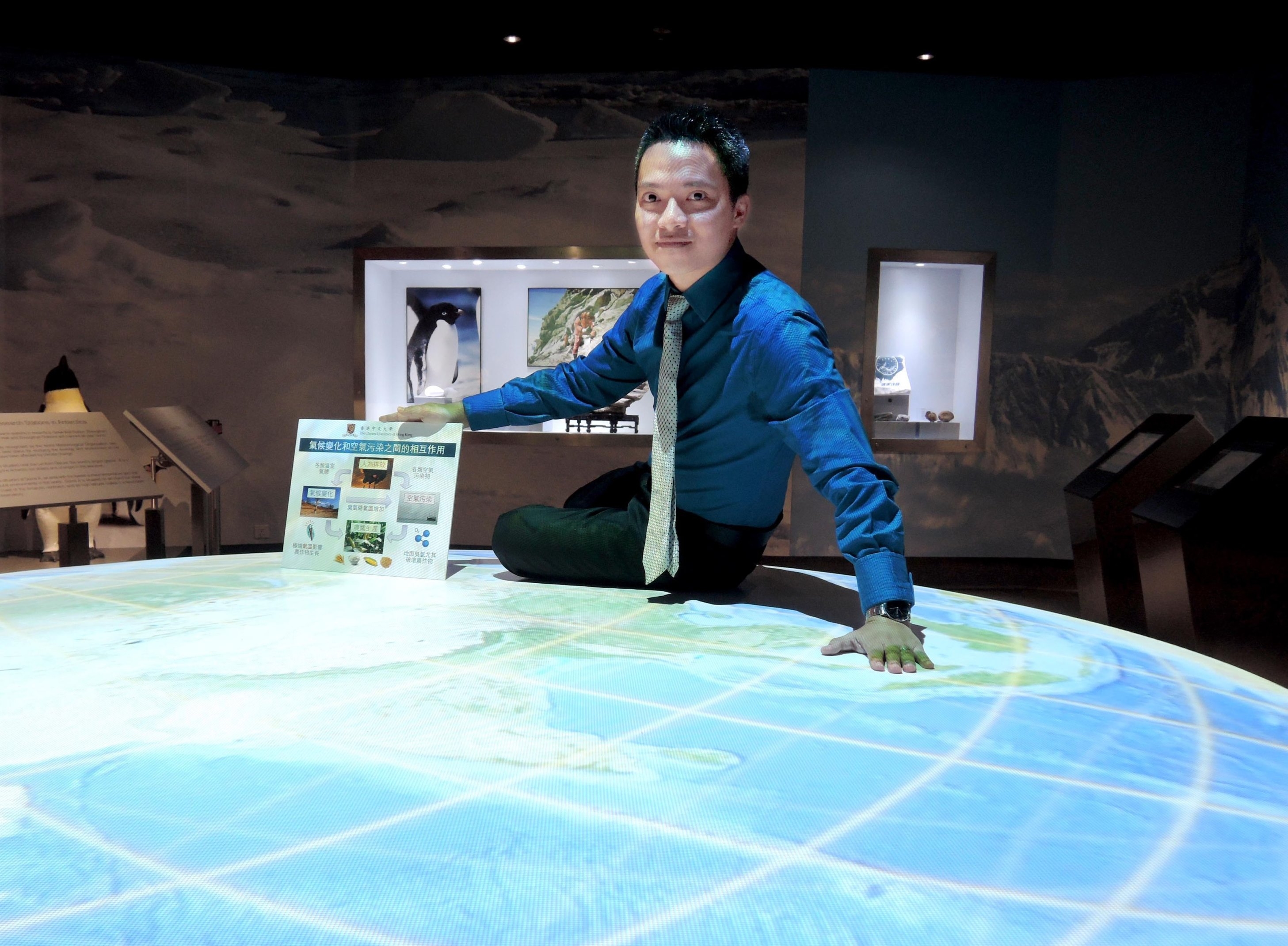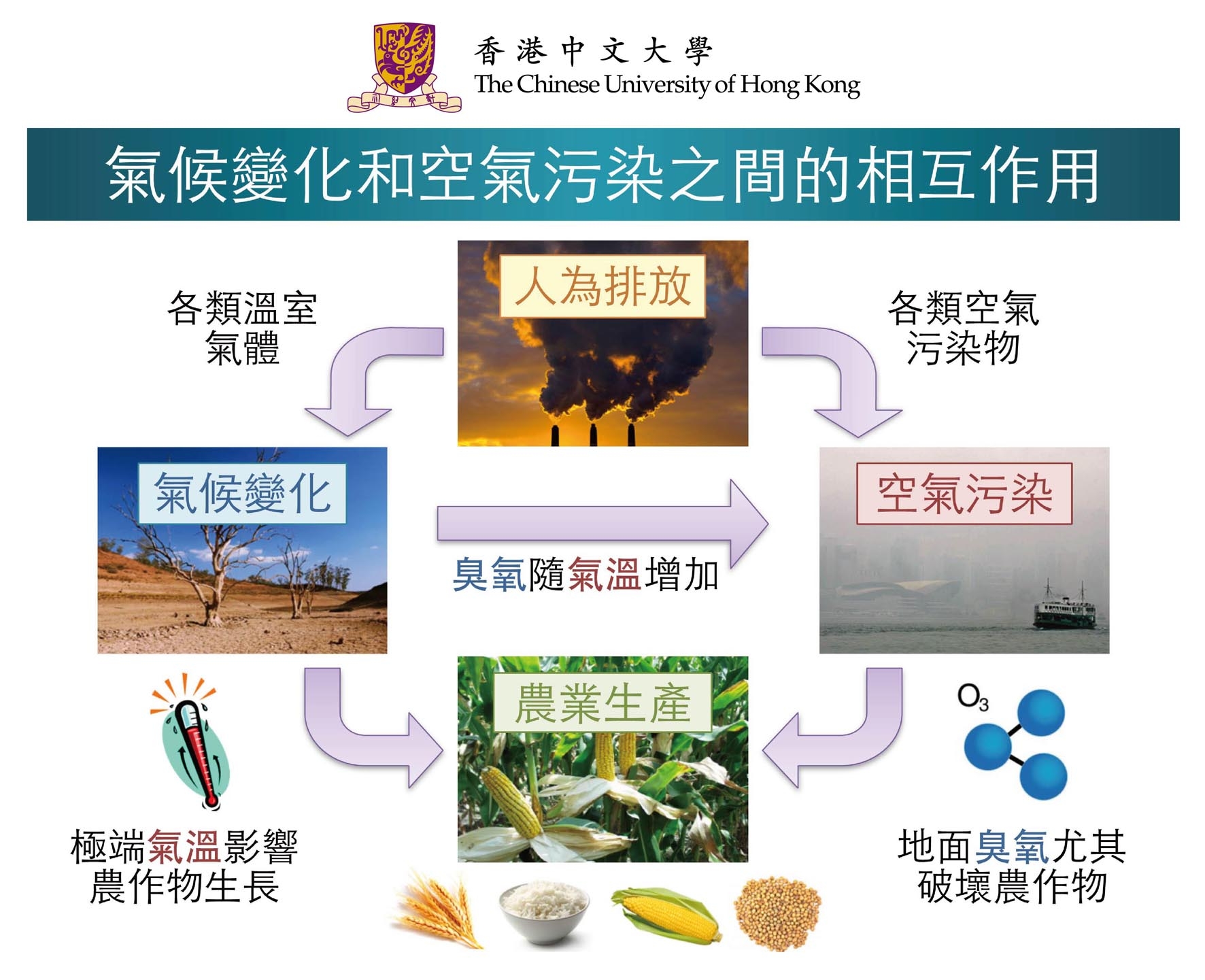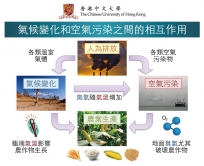CUHK
News Centre
CUHK Researcher Predicts Threat to Global Food Security from Climate Change and Air Pollution in Newly Published Study
Professor Amos P. K. Tai of the Earth System Science Programme at The Chinese University of Hong Kong (CUHK) has used a sophisticated computer model to project that in the next few decades, climate change and uncontrolled air pollution together may severely damage global crop production and increase undernourishment rates, posing a serious threat to global food security and public health. On the bright side, he has found that this damaging impact can potentially be offset by adopting aggressive air pollution regulation and growing more heat-tolerant varieties of crops. The study is the first to consider the interactive effects of climate change and air pollution on agriculture, and the findings are invaluable for guiding agricultural and air pollution policy making. The findings have recently been published in Nature Climate Change, the first-ranked international journal in the field of climate and environmental sciences.
According to the Food and Agriculture Organization of the United Nations, global demand for food is expected to increase by at least 50% from now to 2050. Food production to meet the growing demand is severely limited by both climate change and air pollution. High temperature extremes and air pollutants such as ground-level ozone are highly damaging to crops. ‘Such global-scale impacts on food production will not only worsen malnutrition problems in developing countries, but also lead to greater fluctuations in food prices that will affect all developed regions including Hong Kong, where most food items are imported,’ said Professor Tai.
The global food challenge and pertinent solutions
Growing more heat-tolerant varieties of crops in regions harder hit by warming, known as climate change adaptation, has been identified as an important measure to tackle food insecurity, but how effective will it be, especially when climate change is not the only factor in play? What if some crops are more sensitive to air pollution but not warming? If so, what measures should be taken to ensure food security?
In his study, Professor Tai used a computer model that simulates future climate and air quality, based on a range of future scenarios for human activities, fully considering the intricate interactions between physical and chemical components of the Earth system. It projected that the global average growing season temperature will rise by 1-2°C from now to 2050 in all scenarios considered. Based on a comprehensive suite of historical relationships between ozone, temperature, crop yield and malnutrition observed worldwide, the study projected that the rise in temperature will reduce global food production by more than 10% and increase undernourishment rates by more than 30% in all scenarios considered. Professor Tai then further investigated the impacts of ozone air pollution and found that uncontrolled pollution may further exacerbate the climate impacts, but aggressive ozone regulation worldwide (e.g., by controlling the emissions of hydrocarbons and nitrogen oxides from fossil fuel combustion) can cut down the increase in undernourishment roughly by 50%, partially offsetting the climate impacts.
Professor Tai said, ‘Depending on the region, some crops are primarily sensitive to either ozone pollution (e.g., wheat) or excess heat (e.g., maize) alone, and this gives us a measure of the relative benefits of climate adaptation of crop cultivars versus ozone regulation for food security in different regions. For regions more seriously afflicted by air pollution such as China, the sensitivity to ozone dominates for almost all crops, and thus pollution control, may be more effective in protecting agriculture than a climate-oriented approach. Such findings are invaluable for guiding agricultural and air pollution policy making, and call for greater collaboration between farmers, agricultural policy planners and air quality managers to achieve coordinated economic and public health goals.’
The scientist’s aspiration and future directions
Professor Tai’s leadership of this study began when he was a Croucher Postdoctoral Fellow at the Massachusetts Institute of Technology (MIT), and continued as he joined CUHK as an Assistant Professor in the Earth System Science Programme (ESSC) in the Faculty of Science. He is also a Fellow of the Institute of Environment, Energy and Sustainability (IEES) at CUHK. Together with colleagues at ESSC and IEES, Professor Tai is building a strong interdisciplinary team to address pressing issues arising from global environmental change. Issues range from more accurate projections of climate change impacts at both global and regional scales, to devising the best policies and technological strategies to safeguard our city against the impending environmental threats. Brought up in Hong Kong, Professor Tai has witnessed the enormous environmental changes that have happened in this very dynamic part of the world. His research will continue to examine the interactions and feedbacks between climate, atmospheric chemistry and ecosystems, striving to answer questions relevant to the well-being of human society and the biosphere at large.
The Earth System Science Programme at CUHK
The Earth System Science Programme in the Faculty of Science is an undergraduate programme highly interdisciplinary in nature, in which students study how the Earth works as an integrated complex system and investigate the processes within its components. It provides the knowledge base for understanding and solving important contemporary environmental issues such as climate change, pollution and sustainable energy resources. Students are also introduced to the latest quantitative techniques to observe, monitor, analyze and model the Earth system. The programme will encompass disciplines including physics, chemistry, biology, mathematics and statistics. The corresponding postgraduate programmes (Ph.D. and M.Phil.) are offered by the Graduate Division of Earth and Atmospheric Sciences.
About Prof. Amos P K Tai
Professor Tai is an Assistant Professor in the Earth System Science Programme of the Faculty of Science at CUHK. His research examines the complex interactions between climate, atmospheric chemistry and the biosphere, focusing on aspects that directly impact human society such as air pollution, climate change, agriculture, and public health.
Before he joined CUHK, Professor Tai was a Croucher Postdoctoral Fellow at MIT, where he also obtained his BSc degree. He obtained his PhD in Environmental Science and Engineering from Harvard, where he examined the effects of climate change on particulate matter air quality. Born and raised in subtropical Hong Kong, Professor Tai is an insect enthusiast and hopes to become an amateur entomologist. He also delights in communicating science to non-scientists on especially topics such as environmental conservation and integration of faith and science.





